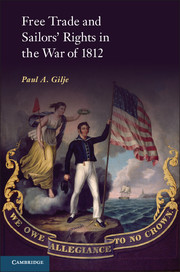Introduction
Published online by Cambridge University Press: 05 March 2013
Summary
On July 2, 1812, Captain David Porter sailed the United States Frigate Essex out of New York harbor. From the “foretopgallant mast was hoisted a white flag, with these words ‘A free trade and sailors rights.’” Porter's cruise was short and incredibly successful. In seventy days he captured ten prizes, including the outgunned HMS Alert – the first British warship to surrender to an American vessel during the War of 1812. This achievement was the beginning of a series of spectacular victories won by the American navy during the opening years of the conflict. When Porter returned to the United States, he was greeted with praise as his sailors poured into Philadelphia's taverns with pockets bulging with prize money. The British, on the other hand, were irate. Porter had disguised the Essex as a merchantman and lured the inferior twenty-gun Alert into range. He had then opened the frigate's gun ports and unleashed a devastating broadside. The uneven battle lasted about eight minutes and, along with the deception, made Porter appear ungentlemanly from the British perspective. As a result, Sir James Yeo of the Southampton, which was a frigate of equal strength to the Essex, publicly issued a challenge. During the bravado that accompanied the exchange, Yeo requested a passenger from a captured brig “to present his compliments to Captain PORTER,” declaring that he “would be glad to have a tete a tete anywhere between the Capes of Delaware and the Havanna, where he would have the pleasure to break his own sword over his DAMNED HEAD and put him down forward in irons.” Porter, who like other American naval commanders believed in the punctilio of the code duelo, responded by returning his compliments to Sir James Yeo, and with tongue in cheek accepted “with pleasure his polite invitation.” Asking to meet nearer the Delaware Capes, Porter pledged “his honor to Sir James that no other vessel shall interrupt their tete a tete.” Porter, in an effort to make it plain that he would not disguise the Essex this time, declared that his frigate “may be known by a Flag bearing the motto – Free Trade and Sailors Rights.”
- Type
- Chapter
- Information
- Free Trade and Sailors' Rights in the War of 1812 , pp. 1 - 10Publisher: Cambridge University PressPrint publication year: 2013



